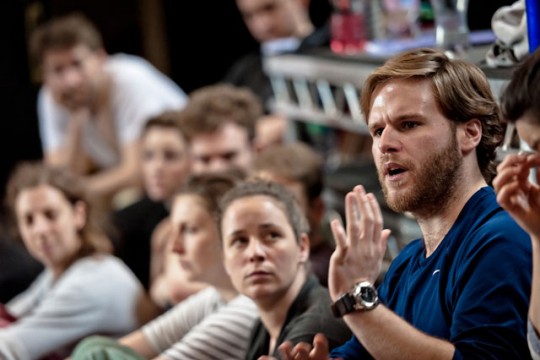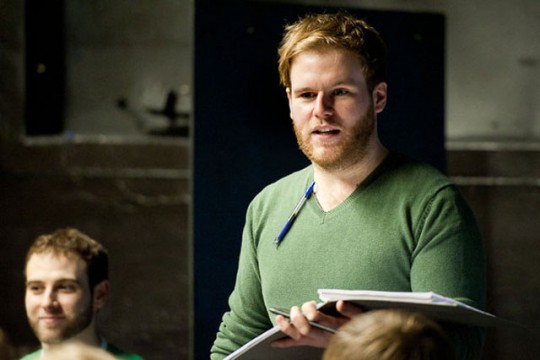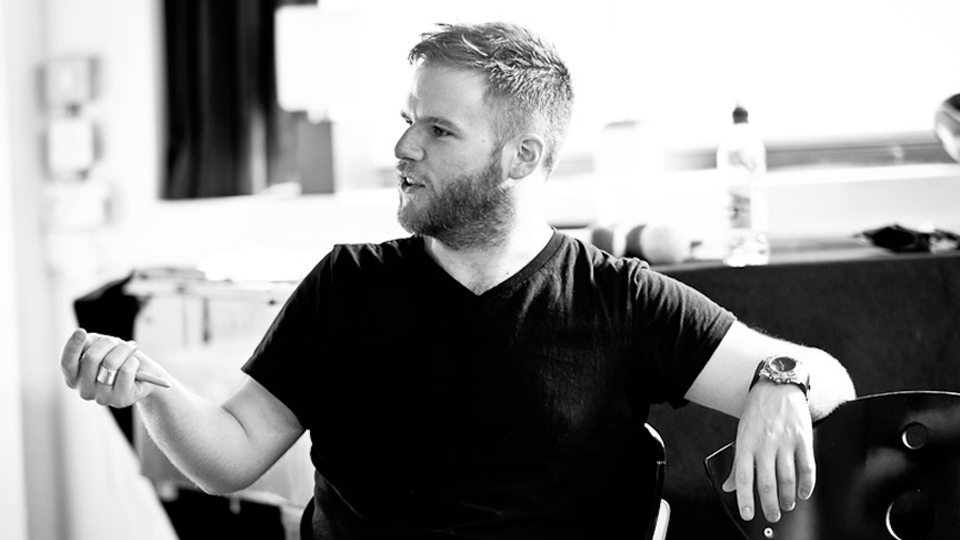Ricky Dukes is the artistic director of Lazarus Theatre Company.
We caught up with him to talk about their last season, in which we saw hugely enjoyable productions of Women Of Troy, As You Like It and King Lear.
He told us about his plans for Lazarus’ forthcoming autumn season, which as well as their staple of the classics, includes the UK debut of Australian musicalThe Hatpin.
How did you get involved in the theatre?
That’s a hard question, because I’ve always been involved in it in some respect, in terms of seeing things, and as with many others my first experience was the annual pantomime. But I became involved as a performer as a kid. I’d sneak off and do school shows. I say ‘sneak off’ because I’m originally from Wolverhampton and musicals, plays and performing were things boys didn’t do (laughs)! Professionally as a director it sprang out of a frustration I felt when training to be an actor at the limit to what I thought I could achieve as an actor. So at drama school I said quite flippantly, ‘I’ve directed things at university before – I could direct something’, and so they gave me a chance and I ended up directing Euripides’ Medea. I like to start small (laughs)!
You seem very partial to Euripides? You did ‘Women Of Troy’ earlier in the season and ‘Iphigenia In Aulis’ is coming up…
Yes, I’ve also done Electra, Orestes, Hecuba… I seem to be going through them all. I think Euripides is the greatest of the three great tragedians. I think he speaks to us far better than the other two, Sophocles and Aeschylus. Although he has a beautiful poetic journey through the text, he speaks the most directly.
You get more interaction between characters in Euripides’ plays compared to the others.
You do, and it helps that he likes his strong women as well, which is powerful. Even when women are dominated or seemingly dominated, I always question: are they? For example with Women Of Troy, it appears all these women are being dominated by this occupying force, which is why I chose to set it in the Second World War in the 1940s, because of the theme of occupation. But really the women are more in control of their own fates than first meets the eye.
Was that part of the thinking behind making ‘Women Of Troy’ an all-female cast?
Absolutely. The first thing that came to my mind when looking at the play, which was about nine months before we did it, was, as whenever I read a play, a setting. If the setting doesn’t come to my mind straight away I put the book down and go back to it a few months later, because I have to find the hook: where is it set? What’s it about to me? When I came to Women Of Troy, I questioned: ‘Who are these women?’ but also ‘Who are they fighting against?’ As I’d set it in the Second World War I thought: ‘Is it the Nazis?’ which is a bit too literal. In the Philip Vellacott translation they always talk about ‘the men’ and ‘the men’ doing it to them. Then you meet some of the men, who are a real disappointment! We then see what we’re supposed to hate, so I thought it would be interesting if we never actually meet them, and the women haven’t met them either. That way they can’t put a personal face to the force that’s controlling them. I wondered if that could be even scarier, so we did a two-day workshop. On the first day we had all women, and on the second day I invited a male actor I’d worked with before to come in and play Agamemnon. The dynamic was incredible. Half the women instantly started flirting with him, and the other half were really resentful that this man had walked into the room. The women, like all characters, were playing tactics as to how they’d survive. So if we don’t know what’s beyond the wall or out there, it adds elements of fear, excitement and the unknown. Some of the greatest horror films are made that way, you think of Psycho, it’s all in silhouette and in what you don’t see… Leave it to the audience’s imagination!

It was certainly very effective, but it reminded me of modern warfare too, which is much more anonymous than earlier conflicts.
Exactly. The act of stabbing someone is quite different to the act of shooting someone, which is far more removed. I can pull the trigger or push the button, but it’s the machine that kills you. Whereas something like stabbing requires someone to physically do it. So Women Of Troy leant itself to a modern-ish setting where the controllers are in a control room somewhere else. They don’t need to be near the women, they send orders down.
Is finding that sort of context for a play that’s now a few thousand years old a way to engage contemporary audiences?
For me, it’s more to do with what we think Greek tragedy is. Whenever I’ve directed one, on the first day we go round the cast asking them to say their name, who they’re playing and what their previous experience of Greek tragedy has been. Nine times out of ten they go for a bad experience. You get the odd one who will mention a great production of something they’ve seen, but generally it’s a negative experience. That’s put down to the distance, where the characters aren’t easily accessible, but presented from afar, or overly moralised: there’s an awful lot of preaching that goes on! But the characters in Greek tragedies are real people. They may be a king, or queen, but they’re real, and going through the same human emotions that we go through today. They’re not that dissimilar really. You only have to turn on the TV and watch the news to see that we’re not that different from Troy! Setting them in a different period, which we do with most of our work anyway, it gives it a different angle. But setting it in the 40s made it a lot more accessible for most of our audience members than having sandals, sand and togas. It makes it more dramatically exciting too. The 40s enabled us to have the women in beautiful dresses from an elegant world that’s just been destroyed. It visually exciting too.
Tell us a bit about the shows you’ve got coming up in your new season. You’re staging a musical, ‘The Hatpin’. How did you get the rights to do that?
It’s an unusual one for us. I’ve directed musicals in the past as a freelance director. About two and a half years ago I was trying to buy a musical CD a month of shows I didn’t know. So I saw this dark, broody, black, scary-looking CD cover and thought ‘that’s the musical for me’. So I listened to it, expecting a semi-Sondheim, semi-Boubil/Schönberg thing as it looked dark and epic. I thought I’d get home and have it on whilst I did some work. I found myself two and a half hours later having done no work and sobbing. If you ask any of my actors they often question if I have a heart (laughs)! So that’s proof I do somewhere! But it’s not the sort of musical you cry at because it’s sad, it’s a musical you cry at when you’re happy. The last ten minutes are just incredible. It takes you on a rollercoaster of a journey: there’s happiness, laughter, sadness, loss. The last ten minutes is possibly the most liberating piece of musical theatre writing I’ve ever listened to, which I know sounds incredibly arty and wanky, but it just takes you to places you’ve not been. In terms of human soul, it’s such an emotional piece that the way the music and the lyrics move through, by the end it just opens up and breathes. So it is dark in tone, and in our production, scenography-wise too, but also musically and lyrically. The most profound thing is that it’s based on a real story.

It’s an Australian piece, isn’t it?
Yes. 2005 I think it was first performed in Sydney. As soon as I’d listened to it I looked at the back of the CD to see who I could get in contact with, and wondered why it hadn’t played in London. So I emailed, and had a response a few weeks later saying they were looking to bring it to London, but at that stage they wanted the original Sydney production here. But I said that although I’d be very excited to see that as an audience member it wasn’t something I wanted to buy in. I wanted to do my own production. Two and a half years later they said yes, and that we could have the UK and European premieres. After so long there’d been a lot of discussion about what I wanted to do to it, as well as what they’d let me do to it (laughs)! And here we are! We finally got it with the help of the Blue Elephant Theatre and the Greenwich Theatre bringing all their resources into it as well. I do big Greek shows and big Shakespeares, but obviously a musical is a different game. I wondered about bringing in other producers with experience of musicals on the fringe, but in the end we thought we’d treat it very much like our own work on the classics, so why not keep it in company? There’s a bigger creative team than we usually have, but that’s trying to bring the best resources. We’ll be working as an ensemble as we do with all our plays, with the same design teams and creative teams that we usually work with. It doesn’t quite fit our artistic vision or mission, as it’s a new piece set in a period, where our other pieces are old pieces set in a different or modern period, so I like to think of it as a bit of an antithesis. It just felt right to bring it in as part of our season. I wouldn’t say it’s a blueprint for a musical to be part of our remit all the time, but it’s certainly a special enough project to allow it to come in to our season.
The remit of Lazarus Theatre Company is generally to reappraise the classics?
Yes, we’re a classics company. The idea is that we re-imagine or reinvigorate classics. Most of the time they’re lost pieces, so in the past we’ve done Jacobean plays that aren’t performed very often. The last year or so we’ve done a lot of Shakespeare and a lot of Greek plays. Next year we’re moving away a little bit from that to the Jacobean and Elizabethan contemporaries of Shakespeare.
You’ve built up a company of actors you work with on more than one show a season.
We have a core of about ten to fifteen actors that we’ve worked with often. Then there’s another eight or so actors we work with a hell of a lot. Because we’re not subsidised we can’t keep them on full time, which is frustrating because it would be great to have a company that joins you for a year or six months, so you can then completely get inside one another’s heads and feel safe with one another. We don’t have that luxury, but it’s nice to have familiar faces to come back maybe not on every project but on every other, or every third. It’s great to have them return and you’ve got that stability and security of you knowing that they know the work. At the same time it’s nice to get some fresh imagination and energy from new people. It normally works out with quite a nice balance. The ideal would be to have three or four people in a cast of twelve to fifteen that we’ve worked with before, so that we have a unit of people who know the process. We work quite differently, so I’m told by our actors, to other theatre companies. It’s quite an intense experience, so to have people in the rehearsal room who’ve been through that is useful for people who are working with us for the first time.
You’re finishing your new season by directing ‘A Midsummer Night’s Dream’ close to Christmastime. What can we expect from that?
We’re still calling it A Midsummer Night’s Dream – but it’s in the winter. The idea is we’re setting it in Italy in the 1950s in a religiously repressed village in the Italian mountains. The dream part of it is the escape of the lovers, so in our edit we’re focussing more on the lovers and thinking about who Titania is when Hippolyta goes into the woods. We’re playing very much with an almost Grimm’s fairytale-like idea of the woods further up the path into the mountains. It’s a real place where mythical things happen the higher up into the mountains you go. We’ve just done a workshop. It’s very movement based and very dark in tone and in humour. It’s going to be quite musical. The Mechanicals are going to be a touring opera troupe who aren’t going to be very good – we’re going to purposely make them not very good, with hopefully much hilarity! And again there’s more black humour because we’re laughing at the misfortune of these very bad actors who really don’t realise how bad they are. Of course whoever we’re casting will beplaying terrible actors. We’re also going to be playing with what is it about the woods that makes you get lost in them. I’ve been listening a lot recently to Sondheim’s Into The Woods. That sums it up for me: the further you get into the woods the darker it gets and the more lost you get. So it’s less fairies and more goblins, but the inner demons of the human rather than physical creatures with wings.
You use a lot of movement and dance in your works. Why is that?
A number of reasons really. One of the first things is that we like editing the pieces down. It’s what I call impact theatre. Instead of a three-hour piece with an interval, you can get everything into an hour and a half or an hour and forty-five. By replacing large swathes of text with movement you can still get across the beauty of the text and the feel of the text but physically, without having to say everything. One of the other things we do is to try to remove as much repetition as possible, particularly in Shakespeare. We did Don Carlos last year and Schiller has a lot of repetition, so if you remove three or four repetitions you create the space to put in something more theatrically exciting. Particularly in text-based plays, something visual or movement-based can do more than just the text can do for a modern audience. It’s about making it accessible without reducing it to nothing: you still take people on a journey. The movement is often at the beginning of our pieces, so the audience forgets they’re in a theatre, or about their horrible journey on the tube or the bus or whatever; and they’re thrown into a whole new world. It gives them a sense of the world as well, with the music and the feel of how people are moving. It completely draws you in. I like to think it’s far more theatrically exciting. We don’t always do it at the beginning, but it’s a great way to start a play, where it acts almost as a prologue. It tells you what you’re going to get during the play.
It’s a good way to grab the audience’s attention.
Yes, it’s like a good overture in a musical!
You touched on it briefly before, but I’d like to end by asking about your plans for 2013?
We’re branching out to other venues, so we’ve plans with other theatres for the spring season next year, which is exciting. We love working with the same theatres quite often, because you know the demands and limitations of the space, what you can and can’t do, and also how to push the boundaries. But it’s also nice to go to venues we haven’t been to before, exploring their audiences and sharing our work with people who might not see our work normally. We’re looking at moving a little bit away from Shakespeare and more to his contemporaries, so there’s a plan for a Marlowe and possibly another Jacobean in there too. We won’t be completely giving up on the Greeks and the Shakespeares, but trying to get back to a few years ago when we were really looking at obscure Jacobeans with plays that other producers and theatre companies aren’t doing: the forgotten gems that have been left on the shelf because they’re too difficult. So we’re up for a challenge! We’d like to tackle the “problem” plays. Let’s give them a new life and get them on stage, as we did with The Duchess Of Malfi and The White Devil, John Webster’s plays. They’re so difficult, particularly The White Devil, which is dense and a bit inaccessible at times, but trying to set it in a different place and light gives you so many new avenues to explore. They’re great plays, just a bit dense on a first reading. We won’t be moving away from Greek tragedy completely, there is one in there at some point next year.
As a classicist I’m delighted to hear that! The best of luck with the autumn season and many thanks for talking to us today Ricky Dukes.
Thank you!
Photographs by Adam Trigg.


